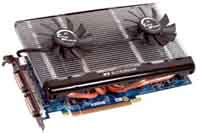 by congo » Fri Oct 10, 2008 9:31 pm
by congo » Fri Oct 10, 2008 9:31 pm
It's still possible to corrupt the OS after plugging the HDD back in if the overclock is still unstable, however, the biggest risk to OS corruption should be avoided if the PC appears to be booting normally.
You need an OS to run most stability proving software, but you could run "memtest" from CDROM drive before reconnectiing the HDD, a pass in a few short tests there would prove it safe to boot your OS.
If you had a spare HDD with an OS on it for testing purposes, you would be immune of course.
You should be comfortable with pulling the side cover off the PC, resetting the CMOS jumper and reconfiguring bios before attempting an overclock. This is no place for he timid.
There is no actual danger to your hardware provided you don't overvolt to the board's maximums in the first place. If your bios is similar to mine, and it should be, then the board's voltages are limited conservatively in the first place.
The 8800GTS is the more powerful card. I recommend a card with a decent cooling solution, I don't like the single slot coolers at all, with their silly little high rpm fans that make a lot of noise and fail on a regular basis.
I'm not completely current on what video card provides the best bang for buck these days, you may want to enquire stating your budget. You also need to weigh carefully whether the new video card is just an interim card or you will be migrating it to a new system later.
Technology tends to be updated quickly these days, I do not like the concept of "future proofing" personally.
Last edited by
congo on Fri Oct 10, 2008 9:37 pm, edited 1 time in total.

Mainboard: Asus P5K-Premium, CPU=Intel E6850 @ x8x450fsb 3.6ghz, RAM: 4gb PC8500 Team Dark, Video: NV8800GT, HDD: 2x1Tb Samsung F3 RAID-0 + 1Tb F3, PSU: Antec 550 Basiq, OS: Win7x64, Display: 24&


 Mainboard: Asus P5K-Premium, CPU=Intel E6850 @ x8x450fsb 3.6ghz, RAM: 4gb PC8500 Team Dark, Video: NV8800GT, HDD: 2x1Tb Samsung F3 RAID-0 + 1Tb F3, PSU: Antec 550 Basiq, OS: Win7x64, Display: 24&
Mainboard: Asus P5K-Premium, CPU=Intel E6850 @ x8x450fsb 3.6ghz, RAM: 4gb PC8500 Team Dark, Video: NV8800GT, HDD: 2x1Tb Samsung F3 RAID-0 + 1Tb F3, PSU: Antec 550 Basiq, OS: Win7x64, Display: 24&
